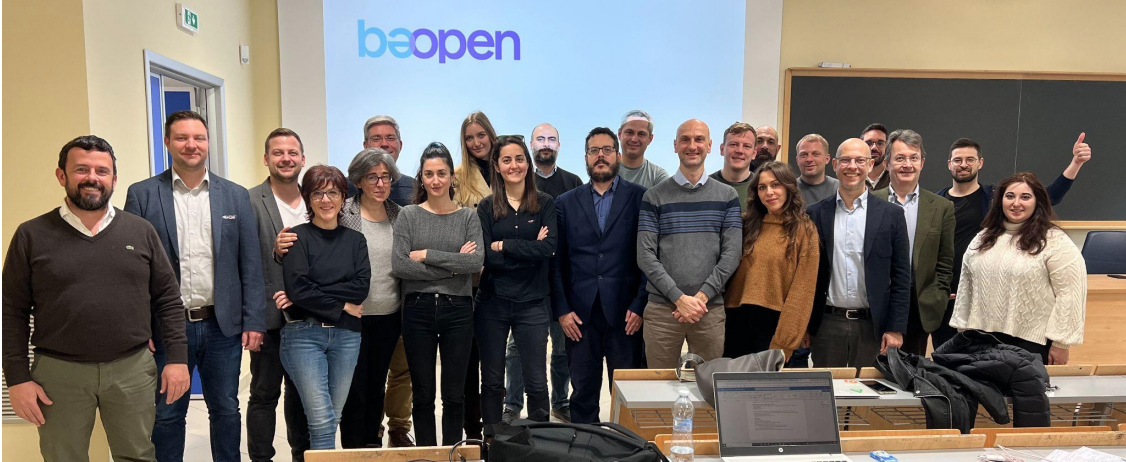European consortium launches project to increase availability and usage of open datasets, leveraging the development of new generation of EU-wide services and AI capabilities
- Funded under the Digital Europe Program the BeOpen project is designed to increase the availability, quality and usability of public sector information in compliance with the requirement of the Open Data Directive.
- BeOpen will build on existing datasets and expertise throughout the combination of the expertise from previous CEF projects (Interstat, Odala, Spotted and Greenmove), FIWARE platform and leading SMEs/start-ups in the exploitation of data
BeOpen will become a holistic framework that will improve technical data interoperability, semantics and quality of the public sector datasets, easing the creation and validation in real-world conditions of AI services built over existing Open Data.
The project, coordinated by Engineering Ingegneria Informática, brings together 18 partners from eight European countries. Eight use cases from 6 countries (Germany, Greece, Italy, Lithuania, Portugal and Spain) will test and validate the framework on the field.
Berlin, 3 April 2023 – A consortium of 18 partners, composed of public bodies, large enterprises, SMEs, research institutions and non-profit organisations from eight countries (Belgium, Germany, Greece, Italy, Lithuania, Netherlands, Portugal, and Spain), met last week in Naples (Italy) to officially launch BeOpen, a project funded under the Digital Europe Programme (DIGITAL-2022-CLOUD-AI-02-OPEN-AI) and coordinated by Engineering Ingegneria Informatica, the digital transformation leader in Italy with a global footprint with around 12,000 associates and over 60 offices spread across the globe.
BeOpen is born with the aim of supporting public administrations at local, regional and national level in increasing the availability, quality and usability of public sector information (High Value Datasets). The project outcomes will enable actors, such as SMEs, start-ups, and large companies, as well as public entities, to re-use and combine open public data across the EU for the development of information products and services, including Artificial Intelligence (AI) applications.
“The project will develop a holistic framework that will improve data interoperability, semantics and the quality of public sector datasets, easing the creation and validation of AI services built over existing Open Data in real-world conditions”, – commented Martino Maggio, project coordinator of BeOpen, Senior Researcher and Project Manager at Engineering Ingegneria Informatica SPA, and added: “Eight use cases in six countries will test and validate the framework over a timeframe of 18 months”.
Strengthening Open Data management and interoperability for Smart Cities
BeOpen gathers a large number of innovation experts with proven experience in data interoperability and provisioning of software for data management. Building upon the already available results coming from four Connecting Europe Facility (CEF) projects: INTERSTAT, Spotted, GreenMov, and ODALA that focus their activities on different aspects of Open Data management, BeOpen starts from a solid and tested baseline of technological solutions for the management of different kinds of data and data interoperability.
Moreover, the project aligns with the guiding principles stated in the Living-in.EU declaration by turning EU cities and communities into smart and sustainable places where people enjoy living and working.
Making data available as Open Data across the EU Member States
BeOpen will support the whole Open Data process lifecycle with the aim of improving the potential of existing and new Open data datasets, maximising their value using them for the creation of IT services. The project will develop a customisable, cost-saving and easy to use open source ‘toolbox’ that will allow public administrations to manage High Value Datasets, make them available and be reused by any interested stakeholder. The toolbox will also facilitate the publication of those datasets in national and European Open Data Portals.
Thanks to the BeOpen toolbox, SMEs, start-ups and large companies will be able to use cross-EU Open Data to scale up and offer EU-wide digital services, such as AI and ML (Machine Learning) based services. This will enable them to benefit from the EU’s digital market opportunities and growth, and ensure the sustainability of the services.
BeOpen will be deployed in several municipalities and regions (Attica Region, Cartagena, Herne, Molina de Segura, Napoli, Porto, Torre Pacheco and Vilnius) through the implementation of eight use cases using existing open public sector datasets to test and validate the developed toolbox. The public actors involved in these use cases will benefit from the developed supporting methodologies and guidelines that accompany the deployment of the toolbox.
With the help of BeOpen, all use cases are expected to improve the availability, quality, and usability of public sector information in compliance with the requirement of the Open Data Directive, in force since July 2019, and the Implementing Regulation. Ultimately, the outcomes of these real-world pilots will reinforce Europe’s ability to manage urgent societal challenges, as they tackle challenges in relevant areas, such as traffic pollution, air quality, lighting and its impact on health, heatwaves, invading species or unpredictable emergencies such as fires, floods or earthquakes.
Additionally, BeOpen will contribute to the common European data spaces ensuring availability of useful data and following Gaia-X principles of highest standards with regards to digital sovereignty.
BeOpen Kick-Off Meeting in Naples (Italy); group picture.
About BeOpen
BeOpen started in January 2023 and will last for 3 years. It has received funding from the European Union’s Horizon Europe Research and Innovation Programme under the Grant Agreement No. 101100807. The project is coordinated by Engineering Ingegneria Informatica (Italy) in collaboration with Arthurs Legal (The Netherlands), Associação Porto Digital (Portugal), Ayuntamiento de Cartagena (Spain), Ayuntamiento de Molina de Segura (Spain), Ayuntamiento de Torre Pacheco (Spain), Comune di Napoli (Italy), Consorzio Meditech (Italy), Datapower (Italy), Ethniko Asteroskopeio Athinon (Greece), Ethniko Kentro Erevnas kai Technologikis Anartyxis (Greece), FIWARE Foundation (Germany), Herne.Digital (Germany), Libelium (Spain), Latitudo 40 (Italy), Open & Agile Smart Cities (Belgium), Stadt Herne (Germany), Ubiwhere (Portugal), Uzdaroji Akcine Bendrove Vilniaus Planas (Lithuania).



